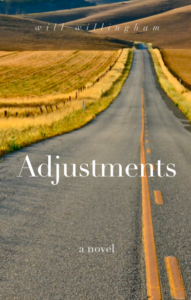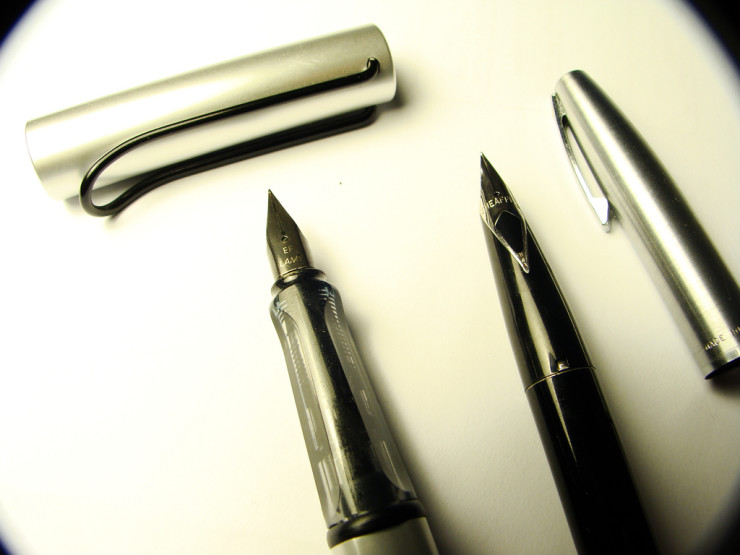Editor’s note: The letter that follows is written by a character in Adjustments. The letter was written as a creative exercise to move past a writing slump, having the character step outside the longer work to engage with the material being explored in the story. You might find this technique useful yourself in order to work past a block in your writing.
_____________________________
22 December 2013
Somewhere in the Midwest
Dear Mr. Keats Esteemed Mr. Keats,
I apologize that I don’t know how to greet you. You wrote a lot of letters in your day, so tell me: How does a person address a dead poet?
You might like to know I write a lot of letters, too. Professionally, anyway. Mostly they are to comply with some state regulation. Or to CYA, as we say: Cover Your—well, you know . We need that a lot in the claims business. So I write letters to stay out of trouble, not to actually correspond with anyone. And I suppose, considering you’re dead and all, this can’t really be considered a true correspondence either.
I’ve been reading your letters—the ones you wrote to Benjamin Bailey and your brothers and J.H. Reynolds. Someone should have told you your letters wouldn’t exactly remain private. Modern readers—and entities charged with national security—have a thing for other people’s mail. It’s why I have a paper shredder. But you wouldn’t know anything about that sort of thing.
Listen. Let me give you some background. I’m not the sort of guy you’d expect to see reading poems. Especially not the sort you wrote—they’re awfully flowery, you know? And they rhyme. A lot. Not really my thing. But a friend of mine gave me an old copy of your Complete Poems. Well, it’s not old to you—it was published a long time after you died. I like to think you’d be happy to see you were bound alongside your old friend Percy Bysshe Shelley. Funny thing with this book. The bindery put the cover on upside down. So I look foolish reading it. Kind of like how the emperor wore no clothes.
But it gives me a slim hope at plausible deniability. If a guy wants to give me a hard time about reading your fancy, flowery poems, I could always pretend I was faking. I could even pretend I was doing surveillance.
So anyway. I have these books. Your poems, your letters, your 578-freaking-page biography. I’m working my way through them because I want to understand this idea of negative capability you talked about. “When a man is capable of being in uncertainties, Mysteries, doubts, without any irritable reaching after fact and reason, ” you said. And knowing how irritable I can be, I suppose I’m more the kind of guy you thought Coleridge was, “incapable of remaining content with half knowledge.” (I wonder, did you think less of Coleridge for this incapacity?)
Mr. Keats, I live in a world—speaking professionally again—where proving things is important. Of course, truth is nice too, but the pursuit of truth takes a back seat to what can be proven because a “preponderance of evidence” trumps truth all day long. I don’t have time for “half knowledge.” There’s not much space for mystery here. Nor for beauty, which seems to be a really big deal for you.
Tell me about this thing you said:
“I am certain of nothing but the holiness of the Heart’s affections and the truth of the Imagination [so you do buy that there’s truth, somewhere]—what the Imagination seizes as Beauty must be truth [No disrespect, Keats, but you’re kidding, right? Imagination and beauty are your measuring sticks? Do you have any idea what happens to guys like you in my world?]—whether it existed before or not—for I have the same Idea of all our Passions as of Love they are all in their sublime, creative of essential beauty—”
Look. You hung out with poets and fancy men. They expected you to know your primrose from a daisy. I spend my days with guys who chew snuff in my truck and spit on the floor, and they like you to believe they’d put their own grandmother out on the front step to save a buck. I can be just like them. (Except for the spitting.) I’ll put on my muck boots and walk through sheep shit to see the roof torn off a barn. And I’ll zip up my coveralls and crawl under the skirting of a house to figure out where the floor joists are sagging. But is that what it means to be a man, Keats? Never mind the truth, just prove it?
Seems like you had to prove yourself too. Even among the critics who thought guys from your side of town couldn’t write proper poetry. You did it, at least in a certain type of company. But it seems your life constrained you, somehow. You sensed something was not right: “My mind has been the most discontented and restless one that was ever put into a body too small for it.”
Was that part of the mystery you lived with? The dissonance of an inescapable constraint—of not fitting into yourself as another might see you? Surely your life was full of mystery. Whose isn’t? It’s not a question of mystery existing, but mystery acknowledged, right?
Nobody’s life is uncomplicated.
But did you bear yours in a body? One “too small” for the person inside it?
You won’t answer me, of course. Whatever your mystery (one you did not ever solve, nor, I imagine, did you want to) you found solace in poetry of all things. Poetry.
You met poetry as though it were a person, one with something to give, something you could give to. “…a friend / to soothe the cares, and lift the cares of man.”
I suppose it’s all nonsense. Writing to you, a dead poet who made much of rhyming flowers. A man who lived for beauty and imagination. A guy who was content to live in the mystery of his life is not going to answer any questions about mine. And were anyone to know I were writing this today, they’d assume your big upside down book fell on my head.
Rest well, Keats.
Warm regards,
William B. Phillips
Featured photo by TMAB2003 and Adjustments Cover Photo by Linda Tanner, Creative Commons via Flickr. Post by Will Willingham.

As much as the characters have a relationship with poetry and story (and they do), it is also a profound book about naming both the things that have held us back and the things we want, to move us forward—about choosing life. While it plays at the level of a few characters’ personal journeys, it is ultimately a novel for our time.
- Earth Song Poem Featured on The Slowdown!—Birds in Home Depot - February 7, 2023
- The Rapping in the Attic—Happy Holidays Fun Video! - December 21, 2022
- Video: Earth Song: A Nature Poems Experience—Enchanting! - December 6, 2022

Maureen says
Can’t help but wonder if Phillips knows about the Negative Capability Press in Mobile and the lit journal ‘Negative Capability’. You’ll find Keats on the homepage.
And has he searched that phrase on Google recently?
Kind of cheeky of him, too, wishing Keats to “rest well”.
L. L. Barkat says
I just read this to my eldest. We laughed. We got quiet. We marveled.
She told me she’s done this kind of exercise before but with far less… [“Aplomb?” I said].
Yes, that’s it, she confirmed that her letters to characters have more often turned into interviews where she is essentially asking the character to reveal his whereabouts and whatabouts to her.
Maybe it’s sort of the same thing. Maybe Mr. Phillips is interviewing Mr. Keats. Hoping to find exactly what he needs. 🙂
Love the little nod to Shakespeare, “made much of rhyming flowers.” This character is more poetic and literarily smart than he might think 😉
Will Willingham says
When a certain editor suggested I write the letter, I sort of scoffed inside, thinking that was an utter waste of time I should have been writing. (I have a certain limited time each week to work on this and I didn’t want to use it on something else.) But it was good. I took a few weeks off the writing, read through the books I had, watched the movie Bright Star (so lovely) and I wrote the letter, which more than anything just enabled me to articulate what I was wanting to know, even though I didn’t get any answers. And then I got back to work. I never got what I was looking for, as is apparent in this part of the story, but it turned out I didn’t need to. 🙂
And yeah, Phillips is disarmingly smart.
L. L. Barkat says
Huh. Did a certain editor suggest that? The editor does not recall.
But, clearly the editor must be, at least in regards to the writing process, disarmingly smart 😉
Will Willingham says
A certain editor did, yes. 🙂
(And the other, yes. 🙂
Sandra Heska King says
So that last line made me laugh out loud.
I’ve read through this letter several times, and each time a different line stops me. Right now it’s this one: “The bindery put the cover on upside down.” Profound.
I can’t wait for this series to start.
Will Willingham says
There is a piece of this letter (would be the last few words of the original last line) that I had to delete because without the context of the story, would have made no sense. But perhaps in a month or so, you’ll laugh again when you realize why the last line is important. 🙂
I can’t wait either. I need to take a little vacation to edit so I can get the first few installments shored up. 🙂
Jody Lee Collins says
Best part of my day? Returning from vacation and eavesdropping on your conversation–Sandra, LL, LW, making me laugh out loud. So looking forward to this.
Bethany R. says
Gripping: “It’s not a question of mystery existing, but mystery acknowledged, right?.” Thank you for writing this.
Diana Trautwein says
Oh, friend. SO good. I hope to goodness I’m signed up cuz I didn’t get this one in my inbox until the newsletter today. Will be get earlier reminders when the series begins? Thank you for this – it is rich on many levels, most of which will take years to uncover. As you know.
Will Willingham says
If you got the newsletter today, then you’re signed up. 🙂 A link to the weekly episode will be included in the newsletter.
And yes, I’m sure I’ll make a little racket about it when we’re about to start. 🙂